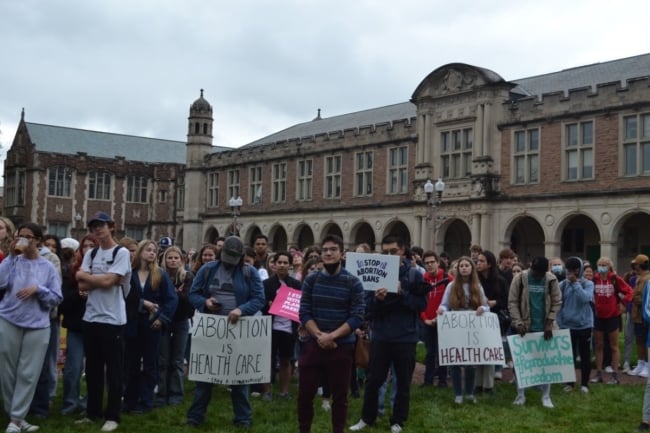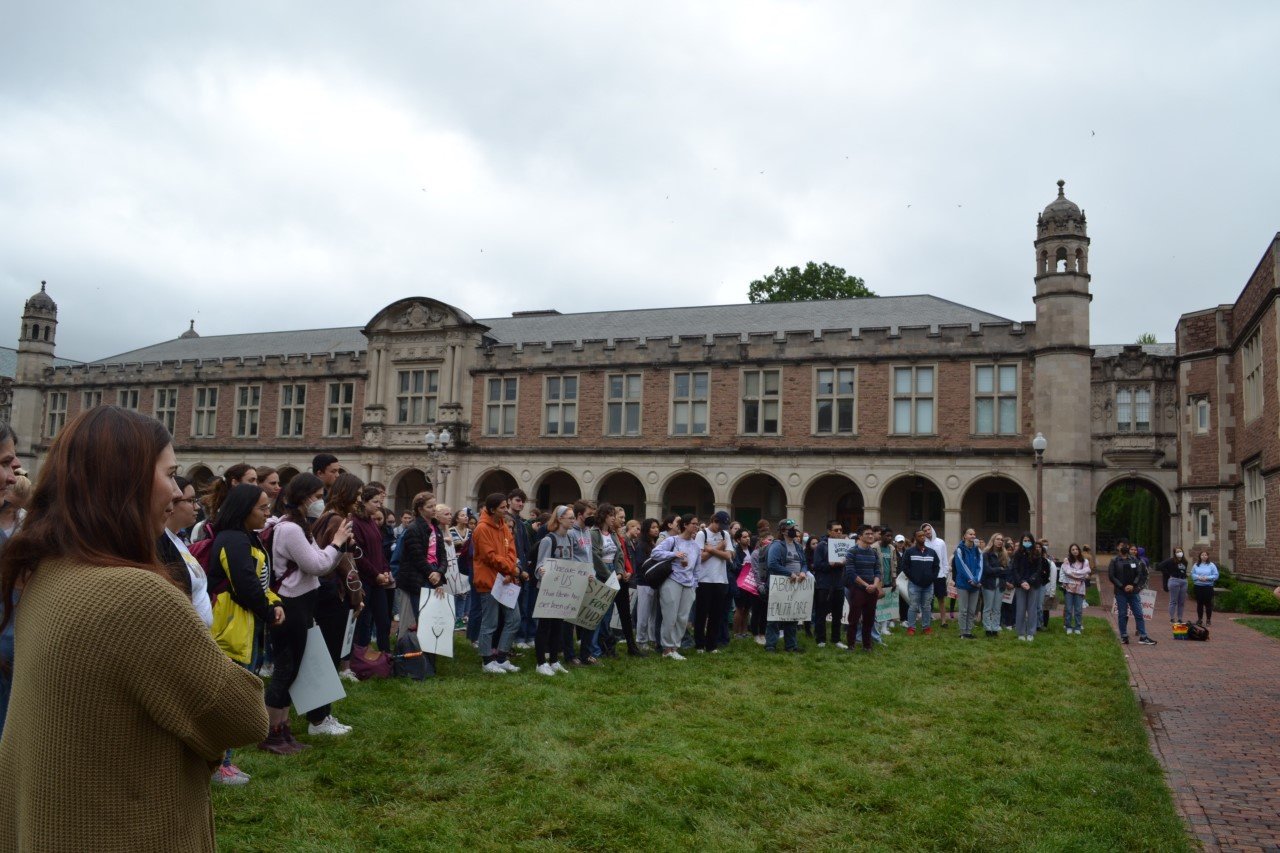You have /5 articles left.
Sign up for a free account or log in.

Students at Washington University in St. Louis protest and call on the university to take a stance on abortion rights.
Courtesy of Sarah Rosen
When Politico reported earlier this month that the Supreme Court is likely to overturn its 1973 Roe v. Wade decision guaranteeing constitutional protection of abortion rights, Sarah Rosen, a rising junior at Washington University in St. Louis, saw her worst fears becoming reality.
“I was shocked, horrified and dismayed,” Rosen said. “But I also wasn’t that surprised, because with the way that the court is stacked and the way that the justices on the court have gone about this issue, it was kind of inevitable.”
Rosen is an executive board member of the Planned Parenthood Generation Action organization at WashU, where the stakes are especially high, because Missouri is one of 13 states that have so-called trigger laws that would outlaw abortion if the Supreme Court overturns Roe.
Rosen and her organization were already advocating to keep abortion legal in Missouri, where the procedure is currently allowed up to the 22nd week of pregnancy. But the leaked draft opinion spurred the group into overdrive. On May 6 Rosen helped organize a rally on campus, which drew more than 300 students, she said.
PPGA also created a list of five demands for the WashU administration, including that the university fund access to out-of-state abortion care for employees if it becomes illegal in Missouri and that it prevent campus police from sharing information with the St. Louis metropolitan police department regarding any abortion care that students, faculty and staff seek.
“We’ve been getting a lot of questions from well-meaning students in social media group chats asking why we choose to call on the university,” Rosen said. “Our answer to that is that the university is an incredibly powerful entity in the state of Missouri. And so while it might be hard for us as individuals to influence our legislators, the university absolutely has that power.”
More than 300 students attended the WashU protest, carrying signs that read, “Abortion Is Healthcare” and “Stand Up for Your Students.” Within two days of posting the demand letter, more than 500 students, faculty, staff and community members had signed on, Rosen said.

Washington University declined Inside Higher Ed’s request for a comment on the issue. But Dean of Students Rob Wild told the student newspaper that the university did not currently plan to take a position on abortion law.
“I know the University, like everything, will continue to closely follow this, and if it’s appropriate for the University to weigh in, I know we will,” Wild told Student Life. “But I can tell you right now the University has no official stance on this particular issue. I mean, it’s a leak, so it’s hard.”
Across the country, students are protesting to keep abortion legal. Students from the University of Texas at Austin marched to the Texas state capitol in support of abortion rights. George Washington University’s student newspaper wrote an op-ed calling on the university to take a stance on the issue.
At Harvard University, abortion rights advocates faced off with a group of antiabortion campaigners on campus.
At Vanderbilt University in Tennessee, another state with abortion trigger laws, senior Neha Dudipala said she and other students of the Generation Action for Planned Parenthood chapter knew Roe v. Wade was going to fall.
“Everyone in my Generation Action chapter has felt that this was a long time coming,” Dudipala said. “Seeing the draft leak out last week, and reading that opinion, was absolutely a shock. But seeing Roe v. Wade possibly being overturned in the next two months is not really a surprise.”
Dudipala said her organization even hosted a picnic in early April to celebrate 49 years of the Supreme Court decision, knowing it could be overturned this year. Vanderbilt’s GAPP marched to Nashville’s federal courthouse earlier this month to protest.
Dudipala said she wishes the university would publicly advocate for abortion rights and the health of students. She expects that even if the university doesn’t do anything to facilitate abortions, students will help each other get access to emergency contraception, such as Plan B, and medical abortion pills.
“At Vanderbilt, fortunately, we are able to access free condoms and stuff like that on campus,” Dudipala said. “I’m sure that there will also be a strong network of students trying to get each other lowered-cost or even free Plan B’s if needed, and I think that that sort of mutual aid will become more common on campus.”
At the University of Texas at Austin, which is also in a state that has abortion trigger laws, Caitlin Carroll, an assistant instructor in the sociology department, teaches a course called Fertility and Reproduction, which covers abortion. After the Supreme Court leak occurred May 2, she scrapped her lecture the next day and led a discussion with her class of roughly 100 students about what the decision could mean.
“I have a range of students, from very firmly anti-abortion, pro-life students to a well-known abortion activist as one of my students,” Carroll said. “I can’t say one way or the other how the students in general reacted. I would say for the vast majority of them, they were scared. And they had a lot of questions.”
As for how overturning Roe v. Wade would specifically impact college students, Carroll said young people in college have a lot of resources that other people of similar ages don’t. Still, she noted that many UT Austin students are first-generation students and come from low-income families, where they may not have access to abortion and sexual health resources. She said the decision could impact what birth control method students elect to use, and whom they choose to have sex with.
“There’s definitely programs that are out there to help students, especially in a big city like Austin,” Carroll said. “But how it will affect them—I can see it already affecting their choices … with my students talking to me about getting things like IUDs and other long-acting reversible contraceptives.”
Carroll said she wishes UT Austin was more proactive about abortion issues on campus, including by offering abortion medication at the student health center. She also said the campus could work to deliver emergency contraception like Plan B to students.
“It kind of makes me angry that we have the student health center, and that’s where students are supposed to go and where insurance works the best for students on the student health plan, but then they don’t offer a very vital, important medical procedure,” Carroll said.
The American College Health Association, an organization of college health professionals throughout the U.S., told Inside Higher Ed via email that the organization supports providing students with all-option counseling that allows them to make their own decisions when it comes to pregnancy.
“An unplanned or unwanted pregnancy can derail a student’s ability to complete their studies and earn a degree,” ACHA spokesperson Rachel Mack wrote. “Research shows that being denied an abortion can negatively impact a woman’s financial health for years and that women who are denied an abortion are also more likely to stay with violent partners.”
Mack urged institutions to be intentional with their messaging going forward and to let prospective and current students know what sexual and reproductive health services are available on campus and in the state.
“It’s likely that there will be more requests for long-acting reversible contraceptives and emergency contraception, and one way schools can support their students is by increasing access to them at their health centers,” Mack wrote. “There have been news reports of people looking to stockpile abortion pills, but we don’t have any data to determine if this is happening on college campuses.”
Students are already experiencing stress and anxiety, Mack wrote, and the possibility of Roe v. Wade being overturned only makes it worse.
“Many students may be anxious about or afraid of losing their right to bodily autonomy, and these concerns could force many students to factor state abortion laws into their admissions decision or perhaps even whether or not to stay and graduate where they are,” Mack wrote.
Olivia Danner, another rising junior at WashU and executive board member of Planned Parenthood Generation Action, said she would have reconsidered attending college in Missouri if Roe v. Wade had been overturned before she was applying to college.
“I’m from California, where abortion is protected much more than in Missouri, and I’m not sure that I would make the same college decision I made if Roe v. Wade had been overturned,” Danner said. “Although many of us at WashU have the socioeconomic privilege to be able to travel out of state for abortion, if Missouri does try to criminalize those who travel out of state, it’s just not worth living in that constant fear.”




